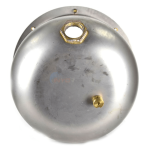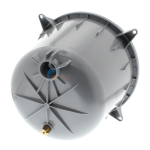Thanks in advance for input. My experience level is very high (mechanical engineer), but not to the level of a professional. I've done light switch replacements and simple fixes around houses / buildings.
My question is on the topic of 120-volt pool lights - an inherently dangerous design where there are many points of failure that could lead to issue, especially as equipment (in a salt pool environment) ages and deteriorates.
I would like to upgrade my 120-volt pool lights to 12-volt. I know that I need an external, electrically isolated 120V AC to 12V DC transformer to power the new lights. However, I have some questions on the wiring and wiring safety:
1- The new lights are 12V DC, but for some odd reason, they still include a green grounding wire (some of them, the Pentair ones do - not sure about all of them). On "pool forums" people have been like "who cares, it's an extra wire, and it's probably there as a requirement so that if someone goes back to 120-volts in the future, then it's safe." Good thinking on the surface, but there is at least one incident where this green grounding wire was not connected to anything (because one doesn't need it on a DC circuit), and then the loose "grounding wire" became looser and contacted a 120-volt hot spot in the junction box and then energized the pool light housing and killed some kid in Florida. Very sad case: Google "Calder Sloan Swimming Pool" for more info (I'm not allowed to post links yet).
2- With that in mind, I think that it would be best (or code) to not mix the 12-volt wiring and 120-volt wiring in the same junction box? Right now, there is a big junction box with five "outputs" - three pool lights, a 120-volt outlet, and I think the fifth one powers the pool cover (not sure). If I don't update this myself, I'm thinking that I should insist that the electrician separate all of the 120-volt from the 12-volt physically with separate junction boxes? Is this code? It would seem like it would be for pool lights.
Thoughts would be appreciated - the typical Google search didn't produce anything useful or definitive.
-Wayne
My question is on the topic of 120-volt pool lights - an inherently dangerous design where there are many points of failure that could lead to issue, especially as equipment (in a salt pool environment) ages and deteriorates.
I would like to upgrade my 120-volt pool lights to 12-volt. I know that I need an external, electrically isolated 120V AC to 12V DC transformer to power the new lights. However, I have some questions on the wiring and wiring safety:
1- The new lights are 12V DC, but for some odd reason, they still include a green grounding wire (some of them, the Pentair ones do - not sure about all of them). On "pool forums" people have been like "who cares, it's an extra wire, and it's probably there as a requirement so that if someone goes back to 120-volts in the future, then it's safe." Good thinking on the surface, but there is at least one incident where this green grounding wire was not connected to anything (because one doesn't need it on a DC circuit), and then the loose "grounding wire" became looser and contacted a 120-volt hot spot in the junction box and then energized the pool light housing and killed some kid in Florida. Very sad case: Google "Calder Sloan Swimming Pool" for more info (I'm not allowed to post links yet).
2- With that in mind, I think that it would be best (or code) to not mix the 12-volt wiring and 120-volt wiring in the same junction box? Right now, there is a big junction box with five "outputs" - three pool lights, a 120-volt outlet, and I think the fifth one powers the pool cover (not sure). If I don't update this myself, I'm thinking that I should insist that the electrician separate all of the 120-volt from the 12-volt physically with separate junction boxes? Is this code? It would seem like it would be for pool lights.
Thoughts would be appreciated - the typical Google search didn't produce anything useful or definitive.
-Wayne








